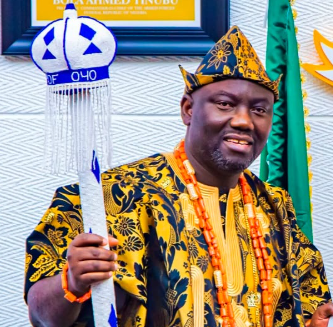...To get all news updates, Join our WhatsApp Group (Click Here)
Also Join our WhatsApp Channel (Click Here)
In a race to conclude all processes before the four-week coronation date set by Governor Seyi Makinde, the new Alaafin of Oyo, Oba Akeem Owoade, has begun preparation for the mandatory traditional rites.
Makinde had on Monday presented a certificate of appointment and staff of office to Owoade, at the Governor’s office, Ibadan, affirming his appointment as the 46th Alaafin.
Speaking on Tuesday, the Head of Oyo princes, Chief Mukaila Afonja, said the princes and those concerned with overseeing the Alaafin’s traditional rites were itching for Owoade to begin the processes.
As part of the processes, he said the Alaafin would visit a number of houses to offer sacrifices, make appeasements, and even sleep over at some of the houses to carry out some night rites.
After performing the traditional rites at some traditional homes in Oyo town, the new Alaafin will then enter Ipebi (seclusion) for the conclusion of the traditional rites within a secluded part of the Alaafin palace.
The ancestral rituals to be done during Ipebi would be the crescendo of rituals before Owoade is crowned Alaafin.
Affirming the traditional processes set to unfold, Afonja said, “Kabiyesi has not started the traditional rites but will start soon. He has gone to prepare ahead.
“He will do some sacrifices, and appeasement at various places before Ipebi at a secluded place in the palace. The governor has given four weeks to do the coronation, so all the traditional rites will be concluded before then.”
Afonja, who is Baba Iyaji of Oyo, appealed to those aggrieved at the emergence of Owoade to embrace the fact that Oyo now has a king.
Afonja’s appeal came as nine royal families from Oyo, otherwise known as the Atiba 9, declared their rejection of the appointment of Owoade as Alaafin.
The Atiba 9 hinged their rejection on that the appointment of Owoade runs contrary to the custom, culture and tradition of Oyo, and is against the rule of law.
Their stance was contained in a statement issued by Prince Sina Afolabi of the Adeitan Royal Family.
The other eight princes from the Atiba Royal Families included Prince Remi Azeez (Tella Okitipapa); Prince Lamola Olanite (Olanite); Prince Agboin Adelabu (Adelabu); Prince Raji Adeniran (Adeniran); Prince Nureni Taiwo (Tella Agbojulogun); Prince Muftau Adejare Adesokan (Adesokan Baba Idode): Prince Adesiyan (Adesiyan) and Prince Bello Rasheed (Abidekun).
They noted that they were not against the persons of Prince Akeem Owoade and Prince Ridwan Gbadegesin, another contestant, as they had the legitimacy to aspire for the throne, but that the process that produced Owoade ran contrary to the tradition of the ancient Oyo Town.
They maintained that they were in court to challenge the processes that sprung up in both Owoade and Gbadegesin.
“What the governor did was totally against the highly revered Alaafin stool. His action has reduced the throne to an object of ridicule.
“It was expected of Governor Makinde, an apostle of due process, to have followed a just line of action and avoid reducing the Alaafin stool or the Alaafin to an Oba Gbandu or Oba Yebuyebu (an ordinary oba without honour).
“When the Ooni of Ife, Oba Enitan Ogunwusi, was to be made the oba, he entered Ipebi and everything was done by the custom and tradition of Ife before he was proclaimed as the Oonirisa.
“We don’t want our revered stool or the Alaafin to become an object of ridicule and mockery in the future. We don’t want him to be referred to as an Oba that was anointed in Ibadan, precisely at the Office of the Governor. We don’t want people to refer to him as an Alaafin who did not enter Ipebi.
“The Alaafin of Oyo is a prominent and first-class traditional ruler in the entire Yorubaland. We, the Atiba 9, are against the process embarked upon by the state government to make Omooba Owoade the Alaafin.
“It should be stopped and the right thing must be done in appointing a new Alaafin.
“We don’t have anything personal against Omooba Owoade who was appointed as the Alaafin on Monday. He too made efforts to become the Oba. We don’t have any personal issues with Omooba Ridwan Gbadegesin either.
“However, our grouse is against the process through which Owoade and Gbadegesin emerged as candidates to the Alaafin Stool. And what Governor Makinde had done by making Omooba Owoade the Alaafin is an attempt to ridicule the throne. We, the Atiba 9, don’t want it!
“We respect Professor Wande Abimbola who consulted Ifa, but if he wants to be fair to all, he should come and consult Ifa at Ojude Ogun here in Oyo,” the statement read.
The Atiba 9 also charged the Oyo Mesi, under the leadership of Basorun, to amicably resolve whatever disagreement they have among themselves, noting that they are the only ones who can initiate the process of selecting a new Alaafin.
“Whatever is the grouse or disagreement between the Basorun and other members of the Oyo Mesi should be resolved.
“They should call themselves together and settle their crisis amicably before any process of installing a new Alaafin can be embarked upon,” the statement further read.
You can get every of our news as soon as they drop on WhatsApp ...To get all news updates, Join our WhatsApp Group (Click Here)
Also Join our WhatsApp Channel (Click Here)

















